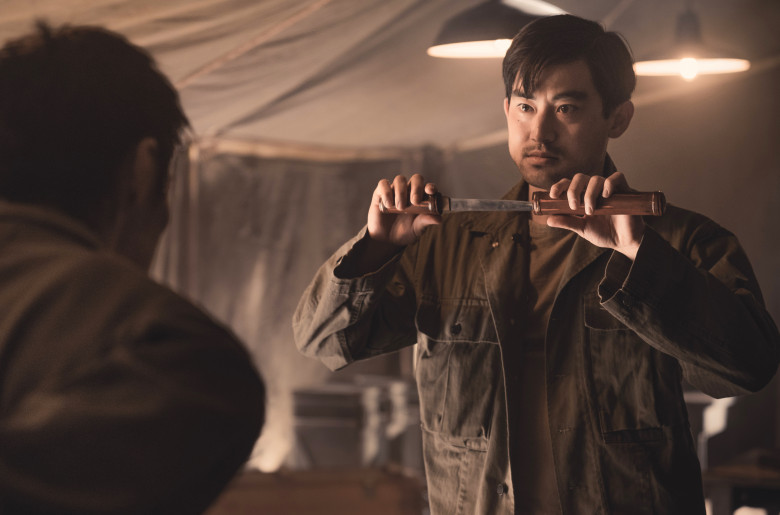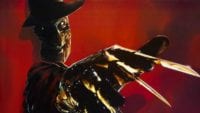This week’s episode of The Terror: Infamy presented many challenges for its audience. They were not challenges of narrative, form, or theme but rather credibility and logic. What went wrong? Let’s go back to the beginning and take a look.
Taking One for Uncle Sam
Chester is in a bad way this week, having learned of the loss of his twin babies in child birth in last week’s episode. There is talk about his mental stability (“cracked” is the term used), yet the show unfortunately undermines this by having Chester simply brood on events, rather act irrationally or, you know, shout about the yurei from the rooftops as he’s wont to do. “He’s fogged over again,” says his colleague Arthur, and I think “wow, let me know when things get really crazy” (this is not to undermine the twins’ deaths in any way, only how the show portrays Chester’s reaction to them).
But there is no time to mourn when you are in the military and in the middle of a war. New translators are coming across from the prison camp to serve at the base in Guadalcanal; Chester’s unit is moving on.
On the boat across, the three translators pass the time. There is a knowing irony about the number of soldiers who come home in a body bag, and a curiously ironic patriotism that ultimately is neither here nor there: “What do you think, ‘Jima? Take one for Uncle Sam? They’ll name a pagoda after you.”
Tajima does not join in the subsequent amused braying. He seems to be distracted, not by something in the distance but some deep festering place inside. His bones crack in a very familiar way, as he turns his attention to a holdall he has with him, the bottom sour and fetid with an as-yet unidentified liquid.
Chester beware: Yuko is coming.
A Woman in Mourning
What of those Yuko has left behind? What of her careful nurturing of Luz?
One of the most frustrating things about The Terror: Infamy is the way plot points are set up as if of some importance, only for them not to be mentioned again. Last week it was Walt being led away for having hidden bootleg saki in the camp. This week, it is the doctor who delivered and failed to save Luz’s babies, who was brutally murdered by Yuko as Luz lay in the same room asleep, that has conveniently been forgotten about.
I pondered last week what the consequences would be for Luz. Surely the military would take a murder on the camp seriously, even of a Japanese man, and Luz would be the prime suspect. Instead the doctor is disregarded now; his use as a plot device, a horror scare, has served its purpose. Whereas a focus on the murder, or even at least a passing mention, would have strengthened the show’s sense of continuity and consequence, instead there is a sense of large, separate set pieces at play, with the threads between seeming inconsequential or unimportant as long as the plot gets from A to B.
So now we get Luz as a type, “a woman in mourning.” We know this because she has become a figure, a symbol to the camp’s children. “There she is, the ghost woman!” they cry as they spy her by the pond, running away as she turns to look at them emptily.
In her long, dirtied, white bed gown, her pale countenance, her straggly matted hair, she is half Sadako/Samara from The Ring, half Kate Bush in the video for Wuthering Heights. She stands vacantly in the snow by the pond, staring with false hope at two mirages of her children on the water’s surface, mirages that fade with the ripples caused by the winter air. There is no hope here.

What is heartbreaking is that Luz is such a likeable character, strong and determined, and while there is nothing wrong with showing a vulnerable female character if done right, there is a difference between vulnerable and just emptily weak. Luz, rather than being a strong, complex character, becomes a recognisable trope, the mourning woman, and one only rendered two-dimensionally at that.
A Tale of Two Fathers
In a further stretching of credibility, Luz’s father appears out of the blue to take Luz home. Where had he been all those months that Luz was in a prisoner camp? He certainly doesn’t suggest that he had been trying to get her out all this time. He had, of course, as a deeply religious man, sent Luz into the streets for conceiving a child out of wedlock, the further implication being that a Japanese father was also a matter of distaste.
Luz’s father claims her brother has died in combat and it is time she came home, as if the death of the brother has reminded him of how precious his children are and how fleeting his time is with them.
The show doesn’t give any indication that he is insincere in this, but I struggle to buy it. This is the first time we have seen the father. All other references to him have come directly from Luz herself and there is no reason to think she is an unreliable narrator as such. Therefore, a quick scene such as this doesn’t really earn forgiveness for the father, neither from Luz nor from us as the audience. It is also curious that he chooses now to come and bring Luz home, after the babies, the original bone of contention, have been lost.
There is one sweet moment to come of all this, though. At the gates to the camp, as Luz and her father are leaving the camp, Henry, in a rare dropping of the guard, chases after them and wraps Luz in a warm embrace. Luz has broken through his emotional armour and it’s clear a connection has now been made.
Luz’s father gives Henry a nod of respect, from one father to another, and that’s it: Luz has left the camp. But will she be back? Where do the writers take Luz now? Wherever it is, I hope it is somewhere stronger and more representative of the potential this character really has.
A Logical Yurei?
Back in Guadalcanal, Chester is arguing above his pay grade. For what? Respect? His commanding officer seems to have some sort of grudging respect for him, but he won’t give Chester what he wants: to interrogate a Japanese POW who has been recovered from a plane crash.
Even though Chester and Arthur are not allowed to interrogate the prisoner due to racial suspicions of the potential for conspiracy, they are inexplicably allowed to guard the prisoner while they wait for new interrogators to appear. Logic, it appears, has gone out of the window with this show.
The prisoner at least is compelling, practically chomping at the bit as he spits out an ear that he gnashed off the head of his last interrogator. Furious and vengeful, the prisoner may be the best thing about this week’s episode, by a mile.
Is he also possessed by the yurei? The show is at pains to suggest he is, from knowing Chester’s name to a particularly spiteful line about Chester’s lost babies.
Chester is near-convinced, but he needs to make one final check to be doubly sure. He takes the prisoner’s photo, which should, if the image of the prisoner comes out blurred, prove that the prisoner is a yurei. There’s just one problem: the image is not blurred. Therefore the prisoner is not a yurei.
It seems a little bit of a simplistic rule for the determination of yurei (blurred for yes, clear for no) but I can forgive this as the show has established these rules from the opening minutes of the first episode and to take issue with it now would be churlish.
What is harder to forgive is the lack of logic. If the prisoner is not possessed, how did he have pre-knowledge of Chester? Yes, he could have reasonably heard Chester’s name being spoken by the guards. But to make comments about the children: if the prisoner was just taking a stab in the dark to find something to hurt Chester with, wouldn’t it have damaged his position if it had turned out Chester had not had kids? And why did the prisoner think that pretending to be possessed by a yurei would make a difference? He didn’t know Chester’s morbid obsession with them. Did he think a “shared” cultural tradition would be enough to scare Chester into letting him go?
What it feels like the show is attempting here is having its cake and eat it. It wants to present Chester as this character pursued by evil and yet have red herrings dangled in front of him to question his sanity. And yet the the prisoner’s knowledge here is too specific to really be an effective red herring. There is too much to convince the audience that the prisoner really is a yurei so that the eventual end result of the bait-and-switch fails to convince or ring true. Instead it deflates the audience.
A Gift of Seppuku
And yet, with the yurei out of the way, shared cultural tradition does play its part in proceedings. Chester and the prisoner converse quite civilly regarding a shared love for that most American of sports, baseball, possibly in an attempt to show shared and common points of interest that can exist beneath the surface of prejudice.
There is a more specifically Japanese tradition in play here as well: Seppuku. This is defined as “a form of Japanese ritual suicide by disembowelment. It was originally reserved for samurai, but was also practiced by other Japanese people later on to restore honour for themselves or for their families.”

Chester understands this idea and perceptively understands that the prisoner has been getting violent and acting out yurei fantasies because he feels a specific kind of shame at being a “coward,” for not killing himself after the crash before he was caught by the guards, the idea being that it is far nobler to take one’s own life in a ritual of honour than to be captured by the enemy and treated like a dog or worse, or to betray one’s country in an interrogation.
To this end, Chester releases the prisoner and provides him with a blade. There is a shared understanding between the two, almost a mutual respect. The prisoner completes the act of Seppuku, but not before leaving Chester with Admiral Takahashi’s birth date, the relevance of which remains to be seen.
You would suspect the military officers supervising there might have questions regarding loyalty for a Japanese man guarding another Japanese man who has come free from his bonds and committed a specifically Japanese kind of suicide ritual on himself. Whereas we can understand Chester’s mixed empathy between his American and his Japanese heritage here, surely a commanding officer might at least raise a suggestive eyebrow in the direction of treason?
Again the show fumbles at the feet of logic. The story Chester tells is that the prisoner broke free while his back was turned (how?) and killed himself before Chester could intervene. The officer doesn’t question this, and if there is a hint he doesn’t fully believe Chester, he is quite happy not to pursue it further either. The Takahashi information is more than his rival officer obtained and that’s good enough for him.
The same will not be said when they pull their guns on Chester as he speeds away in a jeep. Because the new translators are here and with them is a familiar bone-cracking companion.
‘Tazio’
Tajima and friends have arrived and so has Tajima’s bag, heavy and lumpen and stained with unidentified fluids. Blood perhaps? Nobody asks, but maybe that’s for the best: I’m not sure they’d like the answer.
And yet this is the last we see of Tajima. As Chester is walking away, all packed, it is Arthur, his colleague, who confronts him and forces him into a jeep at gun point and tells him to drive. Why Arthur? It makes sense if a spirit wants to get close to Chester, as the two work together. But when did Arthur and Tojima meet? And what has become of Tojima now?
In any case, it seems to be the sight of Chester driving rather than Arthur brandishing a gun that upsets the troops and sets the guns a-blazing. The guns hit their target: the jeep crashes and rolls, trapping its occupants upside-down inside the wreckage.
Chester miraculously survives, as he did last week in the event of the flame thrower. Poor skeptical Arthur though has met his end, it now being too late to take caution against the yurei. And take caution we should because, as Chester tries to free himself, he notices the zip of Tojima’s bag start to slowly open. In a genuinely creepy moment, the bent, twisted, decomposed corpse of Yuko unspools itself from the bag and crawls up to Chester, his fear palpable and contagious. Skull damaged, eyes bulging from their sockets, Yuko says one word: “Tazio.”
Who or what does “Tazio” mean? Has evil finally caught up to Chester, and if so what does it want with him? What has become of Luz?
Join me next week where I hope to find the show has regained some measure of stability in its logic and gets things back on track.


